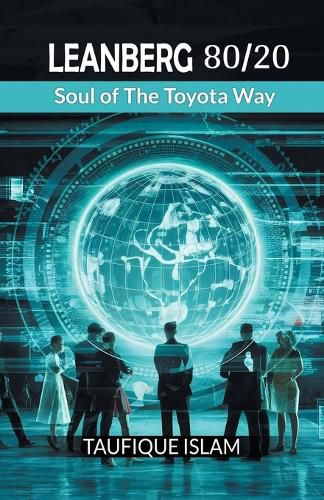Readings Newsletter
Become a Readings Member to make your shopping experience even easier.
Sign in or sign up for free!
You’re not far away from qualifying for FREE standard shipping within Australia
You’ve qualified for FREE standard shipping within Australia
The cart is loading…






This title is printed to order. This book may have been self-published. If so, we cannot guarantee the quality of the content. In the main most books will have gone through the editing process however some may not. We therefore suggest that you be aware of this before ordering this book. If in doubt check either the author or publisher’s details as we are unable to accept any returns unless they are faulty. Please contact us if you have any questions.
Welcome to ""Leanberg 80/20."" This book aims to help readers understand the 18 Toyota Way secrets that can greatly improve their organization's manufacturing productivity. By revealing the often-hidden aspects of Toyota Way concepts, readers will appreciate their importance and be inspired to use them in their workplaces. As you read this book, you'll uncover the true essence of Lean, a method that has transformed industries worldwide. Lean is a major shift in manufacturing, similar to the mass production ideas introduced by Henry Ford and Frederick Taylor in the early 20th century. After World War II, Japanese manufacturers needed to innovate due to limited domestic demand and low profits from mass production. They created a system to handle low volumes and changing market demands effectively, leading to the birth of Lean manufacturing in Japan. However, as Lean has spread to the Western world, it's often applied without the necessary cultural changes, resulting in what is called the mechanistic form of Lean. These mechanical tools offer short-term productivity boosts but fail to address the important cultural and behavioral patterns within an organization. They only scratch the surface, while the true essence of Lean is hidden beneath a deep socio-cultural layer. Many industrial leaders get caught up in the quick benefits of these tools, ignoring the need for broader cultural transformation. In the end, the temporary gains from this approach show that the real benefits of Lean come from its deeper, cultural aspects.
$9.00 standard shipping within Australia
FREE standard shipping within Australia for orders over $100.00
Express & International shipping calculated at checkout
This title is printed to order. This book may have been self-published. If so, we cannot guarantee the quality of the content. In the main most books will have gone through the editing process however some may not. We therefore suggest that you be aware of this before ordering this book. If in doubt check either the author or publisher’s details as we are unable to accept any returns unless they are faulty. Please contact us if you have any questions.
Welcome to ""Leanberg 80/20."" This book aims to help readers understand the 18 Toyota Way secrets that can greatly improve their organization's manufacturing productivity. By revealing the often-hidden aspects of Toyota Way concepts, readers will appreciate their importance and be inspired to use them in their workplaces. As you read this book, you'll uncover the true essence of Lean, a method that has transformed industries worldwide. Lean is a major shift in manufacturing, similar to the mass production ideas introduced by Henry Ford and Frederick Taylor in the early 20th century. After World War II, Japanese manufacturers needed to innovate due to limited domestic demand and low profits from mass production. They created a system to handle low volumes and changing market demands effectively, leading to the birth of Lean manufacturing in Japan. However, as Lean has spread to the Western world, it's often applied without the necessary cultural changes, resulting in what is called the mechanistic form of Lean. These mechanical tools offer short-term productivity boosts but fail to address the important cultural and behavioral patterns within an organization. They only scratch the surface, while the true essence of Lean is hidden beneath a deep socio-cultural layer. Many industrial leaders get caught up in the quick benefits of these tools, ignoring the need for broader cultural transformation. In the end, the temporary gains from this approach show that the real benefits of Lean come from its deeper, cultural aspects.